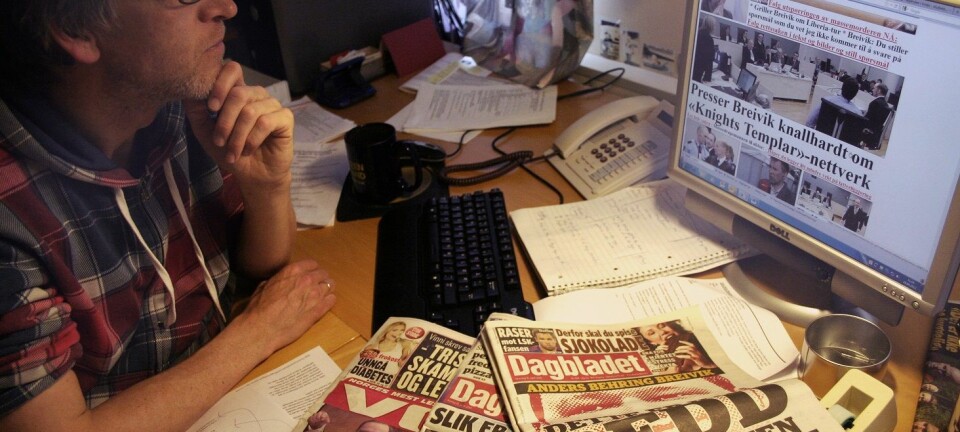
For online media, survival is success
Times are hard for the traditional media, but actually even harder for the new online media. For them, bare survival is a success in itself, new research suggests. This can have consequences for democracy.
The written media of the world are in the throes of existential crises, battling for survival.
The large national newspapers have survived and no business model for online media can finance the large staff of journalists that mans the major national newspapers.
The situation is so serious that the world’s most renowned newspaper, The New York Times, has found itself staring into the financial abyss on several occasions, having seen narrow escapes from the verge of bankruptcy only thanks to massive loans. The business models that traditional media rely on are simply out-dated.
For this reason, the media may well become one of the industries that is revolutionised by a new phenomenon entering the market with the right service at the right time, much like the Danish Skype revolutionised telecommunications.
Few online media can compete with the established media

According to the research paper ‘Survival is Success: Journalistic Online Start-Ups in Western Europe’, online media expecting success, profit and a firm foothold on the market are overly ambitious.
The paper is published by the Reuters Institute for the Study of Journalism under Oxford University and written by Nicola Bruno and the Dane Rasmus Kleis Nielsen, who is also affiliated with Roskilde University.
According to their study, online media should consider every single day of survival a great success.
“Our study shows that the number of news-based online media capable of competing with the established media is extremely low, even though the established media are experiencing a crisis and have reduced the size of their body of journalistic staff,” says Nielsen.
Our study shows that the number of news-based online media capable of competing with the established media is extremely low, even though the established media are in dire straits and have reduced the size of their body of journalistic staff. If you believe that journalism is important to democracy, that’s a serious situation.
Rasmus Kleis Nielsen
"If you believe that journalism is important to democracy, that’s a serious situation."
Only online sales and events secure survival
The researchers have studied new media in France, Germany and Italy.
In Germany, they have looked into three media, of which one had to close before the study was finished and another was experiencing financial crisis. Only one of the three media was successful.
The German market is marked by very solidly established media that have managed to transfer their dominance to the online market. The only site that has managed to survive and keep four full-time employees on the payroll is a culture site that functions as a guide to media coverage of culture and cultural events.
However, the site doesn’t survive on traditional journalistic principles. Less than half of the income comes from advertising, while the rest of the income is secured through online sales and events.
Where the money is: Google, Facebook and Microsoft
Journalism in itself isn’t enough to secure a stable income. The German site Netzeitung is an example of this: attempting to create a traditional newspaper online with a relatively large journalistic staff, the site never managed to make a profit and was forced to close down in 2009.
“There is no doubt that it’s impossible to make do with a business model based on advertisement sales,” says Nielsen. “The value of the users is reduced every year, so it is necessary to grow in order to sustain the income.”
In the field of advertisement sales, the new start-ups are not only competing with the traditional media, but also to a much greater extent giants like Google.
“Advertisers spend more money online, but not necessarily on content providers. The online economy is dominated by Google, Facebook, Microsoft and Yahoo and content distributors like Apple and Amazon, while smaller companies see a decrease in advertisement sales. The situation is very difficult for journalistic online start-ups.”
Online media found a gap in the market
The French and Italian media landscapes differ from the German, but their stories are similar.
For years, the French newspapers have neglected investigative news journalism, choosing instead to focus on background and opinion journalism.
Because of this, the site Mediapart, which offers serious investigative journalism to paying customers, manages to maintain a staff of 20-25 journalists.
“However, this is only possible because there was a gap in the market. The founders are journalists, and via a particularly strong network they managed to find paying customers before they even started,” says the researcher.
However, he’s keen to point out that the business model used by Mediapart is probably only applicable to markets with widely-spoken languages, as the audience needs to be sufficiently large.
Danish success story
On the Danish market, Nielsen points out the site Altinget.dk as a success story. Altinget sells specialised political journalism to organisations and those who need to follow Danish politics particularly closely.
The site consists of 12 different niche portals, focusing on areas such as environmental issues, the job market and housing.
“To the audience that Altinget caters for, keeping up to date on Danish politics is of the essence, and they are prepared to spend resources on this,“ says Nielsen.
“The business model behind the site is notable because it manages to have a stable income. During major political meetings the interest in the site will probably be large, and at other times it may be limited. Thus, the highs will make up for the lows.”
Volunteers and the select few will take the lead
The two researchers have made a decision to focus on areas that are not English speaking. But the English-language start-ups are not much better. For sites that make the cut, like the Huffington Post and the Gawker Network, there is money to be made. But competition from other start-ups and the established media is fierce.
The researchers conclude that contrary to the dynamics that dominate today’s major news media, the news model of the future is likely to be similar to that of preindustrial times, which was based on the work of a few people with help from volunteers.
Journalists will be casual labourers
The future market will not be able to support nearly as many full-time journalists as today. Instead, a journalist’s conditions of employment will resemble those of the artist, with almost no financial security and fierce competition among colleagues who underbid each other, sometimes even working for free.
“But the question of how the poor financial foundation for modern-day journalism will influence the quality of future journalism remains. Many already feel that journalists today are simply passing on press statements and political spin,” says Nielsen.
“It is worth noting that the majority of journalistic start-ups are based on a journalistic motivation.
“Some of the initiatives that we have looked into regard themselves as opposition to the traditional media, as they consider these too closely connected to those in power. In that way, they may improve the quality of present-day journalism.”
----------------------------------------
Read the Danish version of this article at videnskab.dk
Translated by: Iben Gøtzsche Thiele








